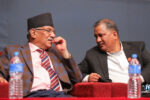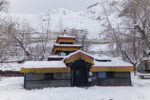ISLAMABAD: Since the announcement of the multibillion-dollar China-Pakistan Economic Corridor (CPEC) project, Pakistani officials have been over-excited about its potential success.
The CPEC was announced in 2015, during Prime Minister Nawaz Sharif’s tenure. The Sharif government took great pride and credit for the overarching project up until Nawaz Sharif’s removal from office in mid-2017.
Over the years, Chinese involvement in Pakistani affairs has increased immensely. On the Pakistani side, some within the business community remained apprehensive about China’s investments while others were hesitant for Islamabad to drift too much into Beijing’s orbit. The Chinese side also had reservations about Pakistan, particularly regarding opportunities for corruption in CPEC projects. But while the Sharif government stood, Islamabad took a concessionary tone toward Beijing when it came to the CPEC.
China has invested heavily in Pakistan but pays far less attention to security concerns than Western investors do. Furthermore, Pakistan’s overall economic health — or lack thereof as the case may be — appears to be a lower priority for China. That said, some analysts say that Pakistan has tried to broaden its investor base and avoid putting all its eggs in China’s basket.
The Chinese have been furious at the continuous allegations made by the Imran Khan government over the project in which close to $60 billion investment had been promised. China has a considerable stake in the project, shepherded by the army at the Pakistan end.
Two senior functionaries in the Khan government brought to power with a helping hand from the army, had made serious allegations against the Chinese. First, it was Prime Minister Imran Khan’s advisor on commerce, textiles, industries, and investment, Abdul Razak Dawood who called a halt to all the CPEC projects for a year.
Talking to the Financial Times, published from London, he said the Nawaz Sharif government had done a “bad job negotiating with China on CPEC — they didn’t do their homework correctly and didn’t negotiate correctly so they gave away a lot.”
The statement caused anger in Beijing, prompting the army to step in. Within days of the Dawood statement, General Bajwa had to rush to Beijing to quench the fire.
The fact that despite the September 2018 controversy, another minister in the Khan government, the Communication Minister Murad Saeed made an even more serious allegation in February this year. He alleged an Rs70 billion corruption in a CPEC project — the Sukkur-Multan motorway. He accused the Sharif government of appropriating the money.
The Chinese responded strongly to the allegations and there were emphatic assurances from no less than General Bajwa. But the disquiet over CPEC refused to die. Then appeared news reports about key CPEC projects being put on the slow back burner. Although senior PTI Ishaq Khakwani denied the reports but not before adding that it was not out of place for a new government to negotiate some parts of the project afresh.
These news reports also alluded to the possibility of the Imran Khan government trying to keep the US humored because of the FATF action and IMF bailout. The US has been outrightly skeptical about the project which, it said, would drag Pakistan deeper into debt, a possibility which China has consistently denied.
The signals coming from Islamabad and Rawalpindi were so divergent that Beijing called Prime Minister Imran Khan to visit China along with General Bajwa in October this year. The Chinese wanted assurance from both of them on the CPEC. This was borne out by General Bajwa sitting on in all the key meetings the Prime Minister had with the top Chinese leadership.
But Mushahid Hussain’s statement shows that the conflict of perception about CPEC between the Khan government and the military is far from over.
(Agencies)









Comment